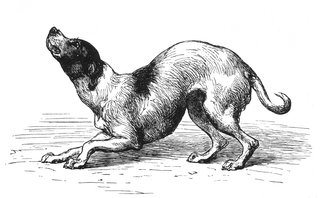Related Research Articles

Mount Holyoke College is a private liberal arts women's college in South Hadley, Massachusetts. It is the oldest member of the historic Seven Sisters colleges, a group of historically female colleges in the Northeastern United States. The college was founded in 1837 as the Mount Holyoke Female Seminary by Mary Lyon, a pioneer in education for women. Mount Holyoke is part of the Five College Consortium in Western Massachusetts.

Comparative psychology refers to the scientific study of the behavior and mental processes of non-human animals, especially as these relate to the phylogenetic history, adaptive significance, and development of behavior. The phrase comparative psychology may be employed in a narrow and a broad meaning. In its narrow meaning, it refers to the study of the similarities and differences in the psychology and behavior of different species. In a broader meaning, comparative psychology includes comparisons between different biological and socio-cultural groups, such as species, sexes, developmental stages, ages, and ethnicities. Research in this area addresses many different issues, uses many different methods and explores the behavior of many different species from insects to primates.

Animal cognition encompasses the mental capacities of non-human animals including insect cognition. The study of animal conditioning and learning used in this field was developed from comparative psychology. It has also been strongly influenced by research in ethology, behavioral ecology, and evolutionary psychology; the alternative name cognitive ethology is sometimes used. Many behaviors associated with the term animal intelligence are also subsumed within animal cognition.

Margaret Floy Washburn, was a leading American psychologist in the early 20th century, was best known for her experimental work in animal behavior and motor theory development. She was the first woman to be granted a PhD in psychology (1894); the second woman, after Mary Whiton Calkins, to serve as president of the American Psychological Association (1921); and the first woman elected to the Society of Experimental Psychologists. A Review of General Psychology survey, published in 2002, ranked Washburn as the 88th most cited psychologist of the 20th century, tied with John Garcia, James J. Gibson, David Rumelhart, Louis Leon Thurstone, and Robert S. Woodworth.
Beverly Christine Daniel Tatum is a psychologist, administrator, and educator who has conducted research and written books on the topic of racism. Focusing specifically on race in education, racial identity development in teenagers, and assimilation of black families and youth in white neighborhoods. Tatum uses works from her students, personal experience, and psychology learning. Tatum served from 2002 to 2015 as the ninth president of Spelman College, the oldest historically black women's college in the United States.

Anna Jane Harrison was an American organic chemist and a professor of chemistry at Mount Holyoke College for nearly forty years. She was the first female president of the American Chemical Society, and the recipient of twenty honorary degrees. She was nationally known for her teaching and was active nationally and internationally as a supporter of women in science.

Anecdotal cognitivism is a method of research using anecdotal, and anthropomorphic evidence through the observation of animal behaviour.
Trevor William RobbinsCBE FRS FMedSci is a professor of cognitive neuroscience and the former Head of the Department of Psychology at the University of Cambridge. Robbins interests are in the fields of cognitive neuroscience, behavioural neuroscience and psychopharmacology.
Karen E. Rowe is an American literary critic and a specialist in Renaissance literature. She is a professor of English at UCLA.
Primate cognition is the study of the intellectual and behavioral skills of non-human primates, particularly in the fields of psychology, behavioral biology, primatology, and anthropology.
Judith F. Kroll is a Distinguished Professor of Language Science at University of California, Irvine. She specializes in psycholinguistics, focusing on second language acquisition and bilingual language processing. With Randi Martin and Suparna Rajaram, Kroll co-founded the organization Women in Cognitive Science in 2001. She is a Fellow of the American Association for the Advancement of Science (AAAS), the American Psychological Association (APA), the Psychonomic Society, the Society of Experimental Psychologists, and the Association for Psychological Science (APS).
Sara J. Shettleworth is an American-born, Canadian experimental psychologist and zoologist. Her research focuses on animal cognition. She is professor emerita of psychology and ecology and evolutionary biology at the University of Toronto.

Cecilia Heyes is a British psychologist who studies the evolution of the human mind. She is a Senior Research Fellow in Theoretical Life Sciences at All Souls College, and a Professor of Psychology at the University of Oxford. She is also a Fellow of the British Academy, and President of the Experimental Psychology Society.
The Comparative Cognition Society (CCS) is one of the primary scientific societies for the study of animal cognition and comparative psychology. The CCS is a non-profit, international society dedicated to gaining a greater understanding of the nature and evolution of cognition in human and non-human animals.
Alejandro "Alex" Kacelnik, FRS is an Argentine-British zoologist, professor of behavioural ecology at Oxford University and E.P. Abraham Fellow of Pembroke College, Oxford. Kacelnik heads the Behavioural Ecology Research Group at Oxford. The author of more than 200 peer reviewed publications, his research focuses on the evolution of behaviour and mathematical modelling. His work uses an interdisciplinary approach, combining data and methods from zoology, psychology and economic theory. In 2011 Kacelnik was honoured by the Comparative Cognition Society for his contributions to the field of animal cognition. He has also received the Cogito Prize for interdisciplinary research linking the natural and social sciences, shared with Professor Ernst Fehr of the University of Zurich, the de Robertis Medal of the Argentinian Society of Neurosciences, and the Raíces ("Roots") Prize for contributions to international collaborations between Argentinian and other scientists.

Nicola Susan Clayton PhD, FRS, FSB, FAPS, C is a British psychologist. She is Professor of Comparative Cognition at the University of Cambridge, Scientist in Residence at Rambert Dance Company, co-founder of 'The Captured Thought', a Fellow of Clare College, Cambridge, where she is Director of Studies in Psychology, and a Fellow of the Royal Society since 2010. Clayton was made Honorary Director of Studies and advisor to the 'China UK Development Centre'(CUDC) in 2018. She has been awarded professorships by Nanjing University, Institute of Technology, China (2018), Beijing University of Language and Culture, China (2019), and Hangzhou Diangi University, China (2019). Clayton was made Director of the Cambridge Centre for the Integration of Science, Technology and Culture (CCISTC) in 2020.
Laurie Renee Santos is an American cognitive scientist and Professor of Psychology at Yale University. She is also Director of Yale's Comparative Cognition Laboratory, Director of Yale's Canine Cognition Lab, and former Head of Yale's Silliman College. She has been a featured TED speaker and has been listed in Popular Science as one of their "Brilliant Ten" young scientists in 2007 as well as in Time magazine as a "Leading Campus Celebrity" in 2013.
The Society for Experimental Psychology and Cognitive Science (SEPCS) (also known as American Psychological Association Division 3; formerly known as the Division of Experimental Psychology and the Division for Theoretical-Experimental Psychology) is a scholarly organization of psychologists in the principal area of general experimental psychology. The goals of this society are to promote, advance, and increase inclusion and exchange of ideas among the scholars in the many subfields of experimental psychology (including but not limited to behavior analysis, psychophysics, comparative, social, developmental, bio/physiological/neuropsychology/behavioral neuroscience, and the many topic areas of cognitive psychology, such as the study of memory, attention, language, intelligence, decision making, and so forth), both in basic and applied research. The society focuses on supporting research through advocacy, training and education, public policy, and outreach. It engages in a wide variety of service work, including leadership in the American Psychological Association's governance.

Clive D. L. Wynne is a British-Australian ethologist specializing in the behavior of dogs and their wild relatives. He has worked in the United States, Australia, and Europe, and is currently based at Arizona State University in Tempe, AZ. He was born and raised on the Isle of Wight, off the south coast of England, studied at University College London, and got his Ph.D. at Edinburgh University. He has studied the behavior of many species - ranging from pigeons to dunnarts, but starting around 2006 melded his childhood love of dogs with his professional training and now studies and teaches about the behavior of dogs and their wild relatives.
William D. Timberlake was a psychologist and animal behavior scientist. His work included behavioral economics, contrast effects, spatial cognition, adjunctive behavior, time horizons, and circadian entrainment of feeding and drug use. He is best known for his theoretical work: Behavior Systems Theory and the Disequilibrium Theory of reinforcement.
References
- 1 2 3 "Karen Hollis - Professor of Psychology and Education". Mount Holyoke College. 23 May 2016. Retrieved June 1, 2016.
- ↑ "Hollis to Head APA's Third Division". Mount Holyoke College. November 16, 2010. Retrieved June 1, 2016.
- ↑ "23 Annual International Conference on Comparative Cognition - April 13th to 16th, 2016" (PDF). Comparative Cognition Society. Retrieved June 1, 2016.